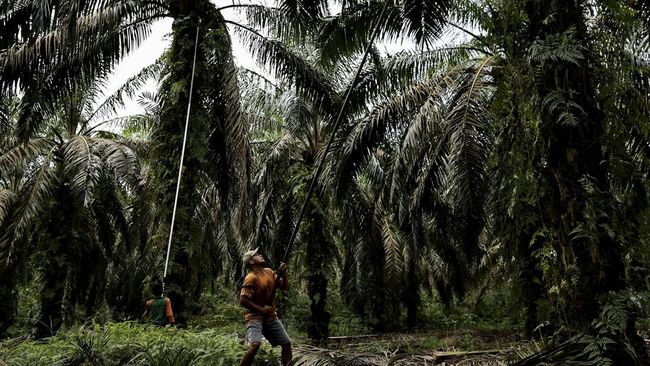The Indonesian Palm Oil Farmers Association (Apkasindo) will deploy farmer in 22 provinces throughout Indonesia to carry out mass actions in response to the impact of the export ban cooking oil.
The mass action will be held on Tuesday (17/5) at 09.00-12.00 WIB. Actions will be carried out simultaneously in a number of provinces.
The general chairman of Apkasindo DPP, Gulat Manurung, said that the ban on the export of cooking oil and CPO had a direct impact on the drop in the price of FFB (fresh fruit bunches) of palm oil throughout Indonesia.
In this action event, Apkasindo will convey five messages to the government. Here are the points:
1. Expressing aspirations to President Joko Widodo (Jokowi) to protect 16 million farmers as a result of the 70 percent drop in the price of palm FFB in 22 palm oil provinces.
2. Asking President Jokowi to review the policy on the ban on exports of palm oil and MGS products and their raw materials because of their direct impact on the price of palm FFB.
3. Asking President Jokowi to not only subsidize bulk MGS, but also simple packaged MGS (Gotong Royong) and to prevent failure, APKASINDO asked to strengthen the distribution network of palm cooking oil, especially subsidized ones by involving the TNI-Polri apparatus.
“We are sure, definitely clear if the TNI-POLRI have been involved. For example, the vaccine program was successful and prevented forest and land fires, the result is that the smoke has immediately disappeared since 2015 until now,” said Gulat, in his official statement, Monday (16/5).
4. The government must immediately make regulations that emphasize that PKS and MGS factories must be managed by cooperatives for 30 percent of domestic needs. This is intended so that export affairs are handled by large companies, so that the scarcity of MGS is not seasonal.
5. Requesting President Jokowi to instruct the Minister of Agriculture to revise Ministerial Regulation 01/2018 concerning FFB (FFB Price Determination) Administration. This is because the price of FFB regulated in the Ministry of Agriculture is only intended for farmers who partner with companies. Meanwhile, according to him, farmers who partner only 7 percent of the total area of smallholder oil palm plantations of around 6.72 million hectares.
“It doesn’t make sense the 93 percent [petani swadaya] their rights are neglected in the price of FFB Disbun,” said Gulat.
|
Illustration. Palm oil farmers throughout Indonesia will hold mass demonstrations to protest the impact of the ban on cooking oil exports. (REUTERS/WILLY KURNIAWAN)- – |
Jakarta will be the main center of the action which will be held on May 17, 2022 at the Office of the Coordinating Ministry for the Economy of the Republic of Indonesia and the Monas Horse Statue. Next, the demonstrators will head to the Presidential Palace to meet President Jokowi to submit their proposals.
This activity will be attended by more than 250 participants involving palm oil farmers who are members of Apkasindo from 22 provinces and 146 districts/cities as well as children of oil palm farmers who are members of the Indonesian Palm Oil Student Forum (FORMASI).
Furthermore, Gulat explained, this action of concern was also carried out simultaneously (same day and hour) in 146 regencies/cities of DPD APKASINDO from 22 provinces.
“Oil palm farmers who come to Jakarta from Aceh to West Papua will dress in their respective cultures, we want to show that palm oil is a unifying nation and a gift from God to Indonesia,” he said.
(dzu / asr)
–


